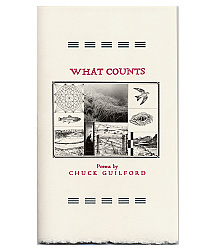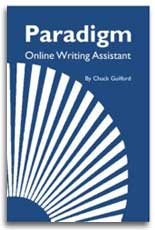As you revise you'll want to get all parts of your paper working together to produce a unified effect. Just as a basketball team whose members work as a unit has a better chance of success than one whose members work at cross-purposes, the papers you write-whether letters, reports, or essays will more likely succeed if they're unified, if they have a singleness of purpose to which every word contributes.
Hardly ever do you write something unless you have a purpose. That purpose may be to ask a favor, to inform, to console, or any of a hundred other things; but it will be there even if only partially defined in your own mind. The first step toward creating unity is to make that purpose clear, first to yourself and then to your reader. In other words, know why you're writing, and let your reader know also.
... know why you're writing, and let your reader know also.
See if you can discover the purpose of the following letter:
Dear D & L Lawn Sprinkling:
As you know, we've had an unusually hot summer, hot and dry. It hasn't rained for weeks, and though the farmers are glad for a chance to dry out their hay, I'm not a farmer, and I'm not so glad to see my lawn drying out and turning brown.
The other day I had some friends over for supper, and even though they didn't say anything about it, I'm sure they wondered why my yard looked like a miniature dust bowl.
Of course it's important to conserve water, and I've been using a lot less water on my lawn lately. That will save me some money, but not enough to pay the $535 bill you sent for overhauling my sprinklers, which still don't work right.
You've spent two weeks on this problem with no luck, and I'm starting to wonder how long it will take and whether I'll have any lawn left to sprinkle when you get done or whether I should just pave my yard and use it for parking.
Sincerely,
Arthur Bledsoe
Mr. Bledsoe is clearly unhappy about his sprinkler system, but his letter isn't clear about whether he intends to pay the $535 bill, and the points about the farmers, about conserving water, and about turning his yard into a parking lot cloud the letter's overall purpose.
If you can state your purpose clearly in one sentence, so much the better. That sentence can serve as a center around which to organize your ideas. Whether you use it in your writing or not, it will help you clarify your thoughts so you can decide what you should say and what you should leave out. If, for instance, Mr. Bledsoe said to himself after writing his first draft, "I want the sprinkler company to know that I'm not paying anything until my sprinklers are working. Will everything I've written help to convey that?" he would hardly leave the letter as it stands. Probably he would see that some of what he'd written was irrelevant and delete it. After that, he might decide what was left didn't look like much and develop it a little, but without losing sight of his purpose. The end result might look something like this:
Dear D & L Lawn Sprinkling:Yesterday I was surprised to receive your bill for $535 for repairing my sprinkler system. Although your men have been working on the system for two weeks, it still doesn't work. During this period my yard has been torn up, and what remains of my grass has turned brown and may be past saving.
I don't know what the problem is. I've talked to the repairmen, and they don't know either. I do know, however, that I have no intention of paying this bill or any other you may send until my sprinklers are working.
If you have a suggestion as to how we can resolve this problem, please contact me. I just want to get my sprinklers working again and will be happy to pay you a fair price once the job is completed.
Sincerely,
Arthur Bledsoe
Notice how the clearly defined purpose provides a basis for deciding what should be cut out and what should be kept and developed. Of course if you have a definite purpose before you begin, so much the better.
3.4Revise the following letter for unity of purpose. What is the writer's main idea? Is it ever stated directly? How could it be made more clear? What parts ought to be cut or expanded?
As you know, the budget deficit is a big problem for all Americans, and we must all do our share to reduce it. In the last presidential campaign several candidates spoke about this issue. Some say the problem is with congress. Others blame the administration.
Only a small portion of the budget goes to the arts, and many people think this is too much. They think artists are just a bunch of beatniks who should get regular jobs instead of asking for tax money to pay for works that they don't like. But who are these people, anyway? Didn't we elect them? And what about the Air Force? They whine if someone even talks about closing a base.
So, as you can see, the arts are suffering. Please write your representative or even the president, and send us a contribution so we can keep the arts alive.
Sincerely,
Eunice E Gladstone, State Arts Campaign
3.5 Go back over a piece of your earlier writing and edit it for unity of purpose. First try to phrase your most important point in one sentence. Next, cut out everything that doesn't clearly relate to your central purpose. As you your new draft emerges, you may want to expand and develop some points that relate to your main idea. If you find it helpful, use your purpose sentence as part of your revised paper.




